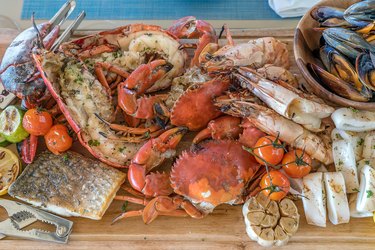
If you love crab and want something a little different, then you may want to give grilled blue crab or grilled Dungeness crab a try. Both of these options are healthy and can be done to suit your tastes.
Grilled Blue Crab
Video of the Day
According to the Florida Department of Agriculture and Consumer Services (FDACS), the blue crab can be harvested and eaten in two stages of the life cycle — either when the skeleton is hard or when it is soft. The soft-shell blue crab is a hard shell crab that has shed its shell by molting. Of the two, soft-shell is considered to be a delicacy because it can be eaten the shell and all.
Video of the Day
To barbecue crab, season to taste with your desired flavors. Heat the grill to medium-high. Brush with a little olive oil unless your marinade already includes it. This helps to prevent the crabs from sticking to the grill. Close the grill. Cook for five to seven minutes.
Open the grill. Flip each crab. Close the grill and continue cooking for three to five minutes. Remove from grill. According to the U.S. Food and Drug Administration (FDA), the crab is cooked when it reaches an internal temperature of 145 degrees Fahrenheit and the flesh is firm and clear.
Read more: 4 Disadvantages of a Pescatarian Diet
Grilled Dungeness Crab
Dungeness crab is, according to the Alaska Department of Fish and Game, a decapod related to shrimp, lobster and other crabs such as the Redrock crab. Its flavor is similar to the blue crab.
When it comes to grilled Dungeness crab, you grill it the same way you do grilled blue crab. In total, fresh crab should take about 12 to 15 minutes on the grill. If you've purchased crab that is already cooked, use the grill to cook until it is heated through. Overcooking can dry out the meat.
To barbecue crab that is still alive, scald them with hot water to stun them. Then proceed with flavoring and grilling as described above.
To barbecue crab that is frozen, either thaw overnight in the refrigerator or run them under cold water to remove debris before grilling. A frozen crab will need a few more minutes on each side to cook through.
Nutritional Value of Crabs
According to the FDACS, blue crab is low in fat yet high in protein. It contains calcium, iron, omega-3 fatty acids and a number of vitamins. It has a delicate texture and sweet flavor.
U.S. Department of Agriculture (USDA) data shows a 3-ounce serving of blue crab contains 74 calories, 15 grams of protein and 1 gram of fat. It contains 76 milligrams of calcium, 1 gram milligram of iron, 30 milligrams of magnesium, 280 milligrams of potassium and 249 milligrams of sodium.
USDA data for the Dungeness crab shows that a 3-ounce serving contains 73 calories, 15 grams of protein and 1 gram of fat. It provides less calcium and iron than the blue crab with 39 milligrams of calcium and half a milligram of iron. It, however, provides a bit more magnesium and potassium at 38 milligrams and 301 milligrams, respectively. It contains 251 milligrams of sodium.
According to a July 2012 study published in Food Chemistry, steaming or boiling crab does little to change its nutritional quality and safety. The study showed that consuming the white meat portions of the crab should be promoted for health purposes, while consuming brown meat portions should be done sparingly.
- Florida Department of Agriculture and Consumer Services: "Blue Crab"
- U.S. Food and Drug Administration: "Selecting and Serving Fresh and Frozen Seafood Safely"
- Alaska Department of Fish and Game: "Dungeness Crab"
- U.S. Department of Agriculture: "Crustaceans, Crab, Blue, Raw"
- U.S. Department of Agriculture: "Crustaceans, Crab, Dungeness, Raw"
- Food Chemistry: "Nutritional Quality and Safety of Cooked Edible Crab"